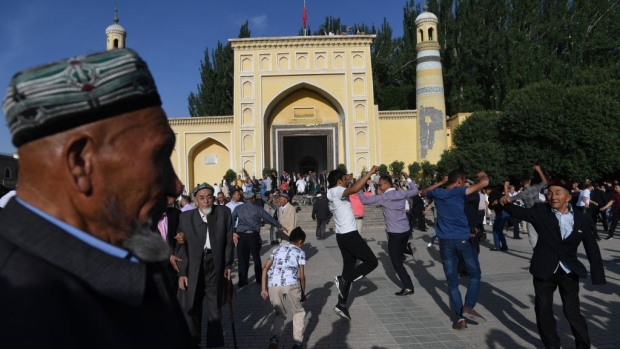Aug 27, 2023
Xi Urges Xinjiang Officials to Crack Down on Religious Crimes
, Bloomberg News

(Bloomberg) -- Chinese President Xi Jinping called on Xinjiang officials to further encourage assimilation of Muslims and curtail illegal religious activities during a visit to the autonomous region Saturday.
“We should always give top priority to social stability,” Xi said in a meeting with local government officials in the capital, Urumqi. “We must further promote the Sinicization of Islam and effectively control all kinds of illegal religious activities.”
Over the past decade, Xi has tightened China’s grip on the region, which is home to millions of Muslim Uyghurs, with additional state surveillance and an expansion of a labor program that Western critics say is tantamount to forced labor. China has denied any human rights abuses in Xinjiang, at one point calling the allegations “the lie of the century.”
“It’s quite striking how this time security and stability seem to take a sort of increased importance again,” said Adrian Zenz, director and senior fellow in China studies at the Victims of Communism Memorial Foundation. “This kind of reiteration clearly reminds officials that the security challenge in Xinjiang is not over.”
The trip was Xi’s first to Xinjiang since July 2022. Prior to that, he visited in 2014, when his government ordered authorities to “strike hard” against violence in the region after a bomb and knife attack at a train station in Urumqi killed three and injured scores others. Beijing has blamed the attacks on separatists.
After that, the Chinese government swept up an estimated 1 million Uyghurs and other local ethnic minorities into mass detention camps for offenses as trivial as having a beard or downloading certain apps to phones.
The US claims those camps were part of a campaign of genocide against the Muslim majority Uyghurs. Beijing denied such claims, calling the facilities vocational training centers that teach valuable job skills.
Read more: Forced Labor Dispute Is Completely Redefining US-China Relations
Washington enacted the Uyghur Forced Labor Prevention Act, which blocks imports from Xinjiang unless companies can prove they weren’t made by coerced workers. Earlier this year, it expanded the ban on imports, placing two more companies on its so-called entity list.
On Saturday, Xi reiterated his stance on the importance of Chinese as a common language among all ethnic minorities in the country. “We must resolutely promote education in the national standard spoken and written language,” he said.
Stability in Xinjiang is also key to increased local economic development, Xi said. The region can promote resources-based industries and is encouraged to build more agricultural and solar industrial parks. Economic cooperation and personnel exchanges between Xinjiang and inland provinces will be supported, he said.
(Updates with details from second paragraph)
©2023 Bloomberg L.P.





